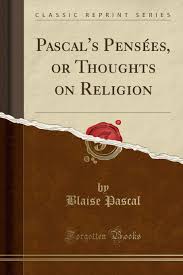Pensées Page #22
The Pensées is a collection of fragments on theology and philosophy written by 17th-century philosopher and mathematician Blaise Pascal. Pascal's religious conversion led him into a life of asceticism, and the Pensées was in many ways his life's work. The Pensées represented Pascal's defense of the Christian religion.
Thus those who only feign these opinions would be very unhappy, if they restrained their natural feelings in order to make themselves the most conceited of men. If, at the bottom of their heart, they are troubled at not having more light, let them not disguise the fact; this avowal will not be shameful. The only shame is to have none. Nothing reveals more an extreme weakness of mind than not to know the misery of a godless man. Nothing is more indicative of a bad disposition of heart than not to desire the truth of eternal promises. Nothing is more dastardly than to act with bravado before God. Let them then leave these impieties to those who are sufficiently ill-bred to be really capable of them. Let them at least be honest men, if they cannot be Christians. Finally, let them recognise that there are two kinds of people one can call reasonable; those who serve God with all their heart because they know Him, and those who seek Him with all their heart because they do not know Him. But as for those who live without knowing Him and without seeking Him, they judge themselves so little worthy of their own care, that they are not worthy of the care of others; and it needs all the charity of the religion which they despise, not to despise them even to the point of leaving them to their folly. But because this religion obliges us always to regard them, so long as they are in this life, as capable of the grace which can enlighten them, and to believe that they may, in a little time, be more replenished with faith than we are, and that, on the other hand, we may fall into the blindness wherein they are, we must do for them what we would they should do for us if we were in their place, and call upon them to have pity upon themselves, and to take at least some steps in the endeavour to find light. Let them give to reading this some of the hours which they otherwise employ so uselessly; whatever aversion they may bring to the task, they will perhaps gain something, and at least will not lose much. But as for those who bring to the task perfect sincerity and a real desire to meet with truth, those I hope will be satisfied and convinced of the proofs of a religion so divine, which I have here collected, and in which I have followed somewhat after this order ... 195 Before entering into the proofs of the Christian religion, I find it necessary to point out the sinfulness of those men who live in indifference to the search for truth in a matter which is so important to them, and which touches them so nearly. Of all their errors, this doubtless is the one which most convicts them of foolishness and blindness, and in which it is easiest to confound them by the first glimmerings of common sense, and by natural feelings. For it is not to be doubted that the duration of this life is but a moment; that the state of death is eternal, whatever may be its nature; and that thus all our actions and thoughts must take such different directions according to the state of that eternity, that it is impossible to take one step with sense and judgment, unless we regulate our course by the truth of that point which ought to be our ultimate end. There is nothing clearer than this; and thus, according to the principles of reason, the conduct of men is wholly unreasonable, if they do not take another course. On this point, therefore, we condemn those who live without thought of the ultimate end of life, who let themselves be guided by their own inclinations and their own pleasures without reflection and without concern, and, as if they could annihilate eternity by turning away their thought from it, think only of making themselves happy for the moment. Yet this eternity exists, and death, which must open into it, and threatens them every hour, must in a little time infallibly put them under the dreadful necessity of being either annihilated or unhappy for ever, without knowing which of these eternities is for ever prepared for them. This is a doubt of terrible consequence. They are in peril of eternal woe; and thereupon, as if the matter were not worth the trouble, they neglect to inquire whether this is one of those opinions which people receive with too credulous a facility, or one of those which, obscure in themselves, have a very firm, though hidden, foundation. Thus they know not whether there be truth or falsity in the matter, nor whether there be strength or weakness in the proofs. They have them before their eyes; they refuse to look at them; and in that ignorance they choose all that is necessary to fall into this misfortune if it exists, to await death to make trial of it, yet to be very content in this state, to make profession of it, and indeed to boast of it. Can we think seriously on the importance of this subject without being horrified at conduct so extravagant? This resting in ignorance is a monstrous thing, and they who pass their life in it must be made to feel its extravagance and stupidity, by having it shown to them, so that they may be confounded by the sight of their folly. For this is how men reason, when they choose to live in such ignorance of what they are, and without seeking enlightenment. "I know not," they say ... 196 Men lack heart; they would not make a friend of it. 197 To be insensible to the extent of despising interesting things, and to become insensible to the point which interests us most. 198 The sensibility of man to trifles, and his insensibility to great things, indicates a strange inversion. 199 Let us imagine a number of men in chains, and all condemned to death, where some are killed each day in the sight of the others, and those who remain see their own fate in that of their fellows, and wait their turn, looking at each other sorrowfully and without hope. It is an image of the condition of men. 200 A man in a dungeon, ignorant whether his sentence be pronounced, and having only one hour to learn it, but this hour enough, if he know that it is pronounced, to obtain its repeal, would act unnaturally in spending that hour, not in ascertaining his sentence, but in playing piquet. So it is against nature that man, etc. It is making heavy the hand of God. Thus not only the zeal of those who seek Him proves God, but also the blindness of those who seek Him not. 201 All the objections of this one and that one only go against themselves, and not against religion. All that infidels say ... 202 [From those who are in despair at being without faith, we see that God does not enlighten them; but as to the rest, we see there is a God who makes them blind.] 203 Fascinatio nugacitatis.[87]--That passion may not harm us, let us act as if we had only eight hours to live. 204 If we ought to devote eight hours of life, we ought to devote a hundred years.
Translation
Translate and read this book in other languages:
Select another language:
- - Select -
- 简体中文 (Chinese - Simplified)
- 繁體中文 (Chinese - Traditional)
- Español (Spanish)
- Esperanto (Esperanto)
- 日本語 (Japanese)
- Português (Portuguese)
- Deutsch (German)
- العربية (Arabic)
- Français (French)
- Русский (Russian)
- ಕನ್ನಡ (Kannada)
- 한국어 (Korean)
- עברית (Hebrew)
- Gaeilge (Irish)
- Українська (Ukrainian)
- اردو (Urdu)
- Magyar (Hungarian)
- मानक हिन्दी (Hindi)
- Indonesia (Indonesian)
- Italiano (Italian)
- தமிழ் (Tamil)
- Türkçe (Turkish)
- తెలుగు (Telugu)
- ภาษาไทย (Thai)
- Tiếng Việt (Vietnamese)
- Čeština (Czech)
- Polski (Polish)
- Bahasa Indonesia (Indonesian)
- Românește (Romanian)
- Nederlands (Dutch)
- Ελληνικά (Greek)
- Latinum (Latin)
- Svenska (Swedish)
- Dansk (Danish)
- Suomi (Finnish)
- فارسی (Persian)
- ייִדיש (Yiddish)
- հայերեն (Armenian)
- Norsk (Norwegian)
- English (English)
Citation
Use the citation below to add this book to your bibliography:
Style:MLAChicagoAPA
"Pensées Books." Literature.com. STANDS4 LLC, 2024. Web. 26 Nov. 2024. <https://www.literature.com/book/pens%C3%A9es_114>.




Discuss this Pensées book with the community:
Report Comment
We're doing our best to make sure our content is useful, accurate and safe.
If by any chance you spot an inappropriate comment while navigating through our website please use this form to let us know, and we'll take care of it shortly.
Attachment
You need to be logged in to favorite.
Log In